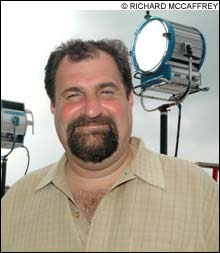
ACTION: Feinberg says the access afforded by Rhode Island's small size is a key selling point. |
When some of his childhood friends in Cranston were starting to party, Steven Feinberg remained transfixed by the movies -- to the point where he envisioned one day serving as Rhode Island’s celluloid king. After forging a career as a writer and producer in California, Feinberg realized this ambition when he returned home to assume the leadership of the Rhode Island Film & TV Office in April 2004.The timing was auspicious. Although filmmakers have long been attracted by Rhode Island’s rich array of settings, from grimy industrial buildings to Gilded Age mansions, a package of tax incentives enacted in 2005 made the state a far more attractive place to do business. The Ocean State has since emerged as a hotbed of entertainment activity, serving as the home of the critically acclaimed Showtime series Brotherhood, the Disney motion picture Underdog, the forthcoming CBS show Waterfront, the Mario Von Peebles-directed film Hard Luck, and the independent movies The Education of Charlie Banks, directed by Limp Bizkit’s Fred Durst, and Normal Adolescent Behavior, featuring Amber Tamblyn of Joan of Arcadia.
The Phoenix recently sat down with Feinberg, 42, at his Smith Hill office to discuss how Rhode Island became a film and TV mecca.
How did you get interested in the movies?
When I was a little guy, I loved movies, and my dad, being a sixth-grade teacher, saw how much I loved movies. Some of the earlier films I really loved were the James Bond films. One day, I asked my dad, “Someone makes these, don’t they?” And he said, “Yeah.” It was a hot summer day, I think I was seven -- you know how Rhode Island is in the sweltering heat -- and you’re a kid, you’re bored. My dad pulled out an old Brownie eight-millimeter camera, and we did Charlie Chaplin Meets Dr. Jekyll. It was a small film. He said, “Why don’t you round up all your friends,” and we rounded up the friends.
You went on to work in Hollywood for a number of years. What brought you back to Rhode Island?
I love Rhode Island, and I love New England. When I’d go back to LA, I always wanted to go only at night, when it was dark, because it was bleak in the daytime. But I knew I wanted to try and have a bi-coastal life, and I thought my feet needed to be in LA and my hands needed to be in Rhode Island. But then I heard Rick Smith [the former head of the RI Film & TV Office] was stepping down, and that the position was opening. And I really felt that Rhode Island, as far as a film and television center, we were woefully unproductive. I felt we had these great ingredients, but that we weren’t being led properly, in my humble opinion. When he stepped down, I thought, “This is the perfect thing for me.”
We’ve seen a lot of movie activity taking place around Rhode Island in recent months. Talk about how this happened?
For me, being that kid filmmaker from Cranston . . . I think it is important to create the Farrelly brothers, or the Michael Correntes, or whoever, the Robert Aldrichs of the past -- you really need to build within while bringing [outside productions]. And I want to cultivate the new filmmakers.